| BACKGROUND
SCREENING NEWS |
Calculating
the Dollar Costs of a Bad or Weak-performing Employee
Almost
every manager, when asked, readily agrees that weak employees
underperform average employees by a significant amount. From
a talent management perspective, if the "performance differential"
between the average employee and the worst employee is 33% or
more, it makes clear business sense to invest in great performance
management and recruiting in order to fix or replace weak performers.
First, consult with the CFO's office (the king of metrics) and
the COO's office with the goal of getting them to partner with
you throughout the calculation process. With their help, you
can avoid any major calculation errors and use their credibility
in order to avoid any future criticism from finance professionals.
Then, follow these six calculation steps: Determine what an
average employee is worth; Determine the "weak performer differential"
between an average employee and a weak employee in the same
job; Quantify the value of the "weak performer differential"
percentage; Determine the "weak performer differential" for
other jobs; Add other "weak performer costs" to the calculation;
and Determine whether weak performers can be improved quickly
and inexpensively. It is surprising that only a few firms have
taken the time to calculate the positive performance differential
that is provided by top performers and the negative performance
differential that the organization suffers because it keeps
weak performers. The best approach is one that is customized
and acceptable to your CFO and your executives.
Read more

Facebook Isn't Actually a Good Way to Judge Potential
Employees, Say Researchers
A new study
from researchers at Florida State University, Old Dominion University,
Clemson University, and Accenture, suggests Facebook is bunk
as a job performance predictor. The study involved the recruitment
of 416 college students who were applying for full-time jobs
and agreed to let the researchers capture screenshots of their
Facebook Walls, Info Pages, Photos and Interests. The researchers
asked 86 recruiters who attended the university's career fair
to review the Facebook pages, judge the fresh-faced seniors'
personality traits and rate how employable they seemed. Each
recruiter looked at just five of the candidates, and got no
other information about them. A year later, the researchers
followed up with the now-graduates' supervisors and asked them
to review their job performance. "Recruiter ratings of Facebook
profiles correlate essentially zero with job performance," write
the researchers. The recruiters looking at Facebook profiles
tended to rate women higher than men, and white individuals
higher than African-American and Hispanic candidates. But those
ratings were not predictors of their actual job performance.
"Our results suggest that Blacks and Hispanics might be adversely
impacted by use of Facebook ratings," says researcher Philip
Roth of Clemson. (The equally disturbing possibility here is
that we'd see the same thing when those recruiters interviewed
those people in person.) Roth says that human resources staff
should warn managers away from using Facebook to review their
applicants.
Read more

A
New Handy Guide to Global DPAs
DLA Piper has attacked the problem of surveying the world's
data protection laws and regulations with a handy online and
interactive guidebook for which they've released version 2.0
just in time for Data Privacy Day. It begins with a map of the
world, with countries colored to indicate the strength of their
privacy laws (red=heavy regulation; green=not so much), and
then you have tabbed options for turning the page to see a specific
country's law, regulator contact information and then specifics
on how a country regulates anything from infosecurity to breaches
to electronic marketing. It's also possible to set two countries
side by side and compare the way they regulate date protection.
They offer a mobile interface, or you can download all of the
information in a readable PDF. "People are saying, 'You're crazy
to give away this kind of information,'" said DLA Piper Partner
Patrick Van Eecke, "but our strategy is that we can give away
this kind of information because we want to get into more complex
legal situations like developing strategies for data protection.
It's not interesting just advising on what you have to do in
one country vs. another. We don't want to make our money with
that." There are 65 different jurisdictions covered in the tool,
and the PDF runs to some 360 pages of information. As a living,
breathing online organism, it will require almost constant updates
so as not to become quickly outdated.
Read more

Security
Check Firm Said to Have Defrauded U.S.
The company
that conducted a background investigation on the contractor
Edward J. Snowden fraudulently signed off on hundreds of thousands
of incomplete security checks in recent years, the Justice Department
said. The government said the company, U.S. Investigations Services,
defrauded the government of millions of dollars by submitting
more than 650,000 investigations that had not been completed.
The government uses those reports to help make hiring decisions
and decide who gets access to national security secrets. In
addition to Snowden, the company performed the background check
for Aaron Alexis, a 34-year-old military contractor who killed
12 people at the Washington Navy Yard last year. The accusations
highlight not just how reliant the government is on contractors
to perform national security functions, but also how screening
those contractors requires even more contractors. U.S. Investigations
Service, now known as USIS, is the largest outside investigator
for government security clearances. It is one of many companies
that has found lucrative government work during the expansion
of national security in the last decade. The government made
the accusations in a 25-page complaint filed in United States
District Court in Montgomery, Ala., where USIS has been the
subject of a whistle-blower lawsuit since 2011. "These allegations
relate to a small group of individuals over a specific time
period and are inconsistent with the strong service record we
have earned since our inception in 1996," said a spokesman for
USIS.
Read more



| BACKGROUND
SCREENING NEWS - continued |
Study:
Employers May Be Using Social Media to Discriminate
According
to a new study from Carnegie Mellon University, employers may
be using their social media research of potential applicants
to discriminate. Using fake profiles on popular social networking
sites, the researchers found that Muslim applicants were less
likely to be called back for an interview than applicants with
a profile suggesting they were Christian. The findings demonstrate
the dangers for employers of consulting sources like Facebook
and the potential for relying upon illegal information like
religion when making a hiring decision. Even seemingly innocuous
information - a quote from a specific religious text, for example
- could lead employers to consider off-limit topics like religion
and open themselves to liability.
Disclosures
about sexuality had no impact on early interest from employers,
the study found.
Read more

Commission
Gives U.S. 13 Ways to Save Safe Harbor
The European
Commission has released its report on EU-U.S. data flows, including
a critique of the widely-criticized Safe Harbor framework, which
makes 13 recommendations to improve the data-transfer mechanism.
The commission says U.S. authorities have until summer of 2014
to implement the recommendations, at which point it will revisit
the review. The recommendations call for self-certified companies
to disclose their privacy policies and any privacy conditions
based on relationships with third-party vendors; improved facilitation
to redress methods, including links on certified companies'
privacy policies to alternative dispute resolution (ADR) providers;
notification to EU authorities when complaints are filed with
the U.S. Federal Trade Commission (FTC), and for the national
security exception-which allows law enforcement access to data-to
be used "only to an extent that is strictly necessary or proportionate."
There is also a call for self-certified companies to include,
within their privacy policies, information on "the extent to
which U.S. law allows public authorities to collect and process
data transferred under the Safe Harbor." Dutch MEP Sophie in'
t Veld, vice president of Parliament's Civil Liberties and Home
Affairs Committee, said she's glad the commission is taking
steps, but, "We've been calling for an evaluation or even suspension
action for many years, so this report is overdue." She said
the report is a signal that things are starting to shift.
Read more

How Can Youth Service Providers Keep Sex Offenders Out?
Most all youth-serving organizations rely upon criminal
background checks (CBC) to filter out applicants with sex offenses.
According to Michael Johnson, youth protection director of the
Boy Scouts of America, a complete reliance on CBCs, however,
could be a major error. "Bottom line? You should do them," he
said, "but the expectation -- and that is, the be-all, end-all
-- is a big, humongous mistake." Johnson said criminal background
checks themselves may be one of the reasons why some child predators
end up in youth-service positions. Perhaps the largest downside
to relying on CBCs, Johnson said, is that it only filters out
sex offenders who have been arrested and convicted. "The vast
majority of offenders who are actively sexually abusing haven't
been arrested and haven't been convicted, so criminal background
checks are very limited in what that information can provide
you." Various forms of background checks are available, and
online sex offender registries are improving. However, there
are still many challenges facing youth-serving organizations;
among them, he said, were state-by-state variance in sex offender
classifications. Resources provided by organizations like the
National Center for Missing and Exploited Children were likely
the best places for youth service providers to turn to for information
on background checks and standards pertaining to sex offenders.
Other common protective measures include leadership selection,
interviews, reference checks and the monitoring of staffer and
volunteer behavior.
Read
more

2014
Brings Change to Oregon Landlord-Tenant Law
Landlords
and renters alike stand to benefit from the Landlord-Tenant
Omnibus Bill (Senate Bill 91), which took effect Jan. 1. Noncompliance
fees are changing and for the first time, Oregon landlords can
require tenants to maintain rental insurance. It also introduces
Section 8 Vouchers as a Protected Class. Renters can no longer
be turned down solely due to their dependence on government
assistance for housing. The legislation still allows landlords
to conduct a tenant background check for criminal records and
eviction history. The law also places new limits on tenant screening,
limiting the scope of tenant screening and how a landlord can
evaluate a rental applicant's criminal records check. "With
Senate Bill 91, a landlord may not consider a previous arrest
of the applicant, if the arrest did not result in a conviction,"
said Christi Lawson, partner at Foley and Lardner LLP. In addition,
Oregon is the first state to implement a 5-year rule about reporting
eviction records. "This is a big change for the tenant screening
industry," said Caryn Bennett, Contemporary Information Corporation
(CIC) compliance manager. "For a long time tenant screening
included using an applicant's current and previous addresses
to run a report. "Now, with the changes in Oregon, our filters
and algorithms need to take into consideration where a prospective
tenant is moving," she added. The algorithms and filters provide
landlords with comprehensive tenant screening reports, allowing
them to make informed rental decisions, while maintaining compliance
with the latest legislative changes.
Read more

Kenmore
Representative David Frockt cosponsors tenants' rights legislation
Sen. David
Frockt, D-Seattle, and Sen. Jeanne Kohl-Welles, D-Seattle, are
co-sponsoring legislation that would support tenants' rights
and make housing more affordable to renters in Washington.
If enacted,
SB 6291 would streamline the process of tenant screenings by
potential landlords by allowing a prospective tenant to obtain
a single standardized comprehensive screening report and use
it when applying to rent housing for up to 30 days without being
charged a tenant screening fee by the landlord. The comprehensive
report would include consumer, criminal and eviction history.
If a landlord wished to use a different report, the landlord
would have to pay the expense themselves.
SB 6292
would require notice of rent increases 90 days prior, up from
30 days currently, as well as provide tenant relocation assistance
to a broader base of renters.
Read
more

CIC's
Partnership with Experian Delivers Free Tenant Screening to
Real Estate Agents
CIC, a
nationwide leader in tenant screening for the multifamily housing
industry, recently partnered with Experian to launch ApplyConnect,
a free tenant screening solution for real estate agents. ApplyConnect
builds on a process created by Experian whereby credit reports
can be requested and viewed on an individual basis and combines
it with CIC's industry leading tenant screening products.
ApplyConnect
combines a comprehensive tenant background check that provides
a complete credit report with the VantageScore 3.0 scoring model.
The tenant screening report includes a nationwide criminal records
search, including the sex offender registry, and eviction history
provided by the most comprehensive eviction records database
in the U.S.
By simplifying
the process, real estate agents no longer have to deal with
the hassles of traditional tenant screening. Applicants and
real estate agents can now quickly share tenant screening reports
through a secure online system. Not only does ApplyConnect simplify
tenant screening, but as a consumer-initiated product, it is
the first of its kind to deliver all the elements needed to
evaluate a potential renter's credit report and background check
with zero impact on the applicant's credit score. The credit
check is considered a soft inquiry as the applicant chooses
to share their credit report with a real estate agent.
Read more

FCRA
Violations Against Background Screener Results In $18.6 Million
Settlement
Plaintiffs'
counsel filed a Motion for Preliminary Approval of a Proposed
Class Action Settlement against two Verisk
Analytics companies - Intellicorp Records, Inc. and InsuranceInformation
Exchange, LLC - for alleged violations of the Fair Credit Reporting
Act ("FCRA"). The matter is pending in the United States District
Court Northern District of Ohio and the consolidated case number
is Case No. 1:12-cv-02288.
The motion
alleges that Intellicorp Records, Inc. ("Intellicorp"), a background
screening company, allegedly violated the FCRA. The settlement
provides substantial monetary and non-monetary relief, including
cash disbursements totaling $18.6 million and
the monetary value of free consumer reports to all Class Members
upon request (there are approximately 545,000 class members).
Judge James
Gwin signed the Preliminary Approval of Class Action Settlement
November 25, 2013. A hearing to decide on Final Approval will
take place May 23, 2014.
Read more

Congress Approves Bill to Help Strengthen Government Background
Checks
The U.S. House of Representatives has passed a bill
that would increase oversight into how the government conducts
background investigations. The bill, H.R. 2860, the OPM IG Act
(Office of Personnel Management Inspector General Act), will
give the Office of Personnel Management (OPM) inspector general's
office access to new funding to conduct audits, investigations,
and other oversight activities. A nearly identical bill, the
Security Clearance Oversight and Reform Enhancement (SCORE)
Act, passed the Senate in October. Both bills were written partly
due to reports about inconsistencies and lack of thoroughness
in the background checking process. They were also written due
to questions about background checks resulting from some recent
high profile cases. The bill would provide oversight of the
$2 billion OPM revolving fund that federal agencies pay into
for human resources services, including conducting background
checks. "For many years, there have been increased referrals
of alleged fraud within the revolving fund operations, including
in the background investigations used to determine an individuals'
eligibility for a security clearance," said Rep. Blake Farenthold.
"That's a big problem with serious national security implications."
The House and Senate bills "will increase oversight and empower
watchdogs to make our nation safer and our government more efficient,"
said Sen. Jon Tester after the House approved its version of
the bill.
Read
more

| Welcome
to the U.S. Legal Challenge Question! |
Sponsored By:


As the background
screening industry continues to get more competitive the firms
that will ultimately succeed will be those that create competitive
advantage through their people by offering continuous learning
opportunities to heightened their knowledge and capabilities.
We believe that having employees that are very knowledgeable about
the legal landscape of background screening is essential to continued
success.
We are grateful
to Larry D. Henry who began his law career with the Army JAGC
where he tried over 2,000 cases. After the Army he relocated to
Tulsa. In 1981, the founder of DAC Services contacted Mr. Henry's
firm for assistance in creating a background screening company.
Since Mr. Henry's practice was employment law, the firm believed
this fell within his area and as they say: "the rest is history".
His practice has kept him in continual contact with the background
screening industry, and he is a nationally recognized expert in
the area of background screening.
Mr. Henry's
practice is concentrated on employment law and in specific, background
screening of employees. He represents consumer reporting agencies
throughout the United States and two national trade associations.
He is the author of the Criminal Records Manual and the on line
reference site:CRAHelpDesk.com, and he is a frequent presenter
across the country on various topics dealing with background screening.
Please choose
your answer by clicking on it:

New
Jersey Legislature Introduces "Ban The Box" Bill
The New Jersey
Legislature recently introduced the Opportunity to Compete Act
that would impose significant restrictions on criminal background
checks in connection with the hiring process. The law would prohibit
employers from making inquiries into a candidate's criminal history
during the application process and would restrict inquiries concerning
a candidate's criminal history until after a conditional offer
of employment is made. Even then, the employer would have to provide
a standard written notification of rights to the candidate's consent
to do so.
Substantively,
the Act outlines what types of criminal history could be considered.
Employers would not be permitted to consider: non-pending arrests
that did not result in a conviction; any record that has been
erased, expunged, or pardoned; and any adjudication of delinquency
of a juvenile. Finally, employers would be required to consider:
information concerning rehabilitation; information concerning
the accuracy of the criminal record produced by the candidate;
the amount of time since the conviction; and the relationship
of the crime to the position sought.
The New Jersey
Division on Civil Rights would be charged with enforcement of
the Act.
Read
more
(
Click here for a copy of the proposed law )

New
Policy on School Volunteer Background Checks Stalled
The school
board looked to the state for guidance during a workshop on how
to revise the district's policy on criminal background checks
for volunteers. The problem is the state has only detailed strict
background screening guidelines for employees and less-strict
guidelines for contractors through the Jessica Lunsford Act. "There
is simply no clear statute that says what is the criteria for
a volunteer," said board attorney, Dennis Alfonso. "The law leaves
it to you to draw the line." The district's policy on criminal
background checks for volunteers is historically more stringent
than that for contractors who might have little or no student
contact. The challenge is to find a way to align the district's
policy with state law without barring suitable volunteers over
minor criminal offenses, or allowing non-suitable volunteers to
slip through the cracks. Neither option appears to be without
potential lawsuits, board members said, due in part to "loopholes"
in the Jessica Lunsford Act. Safety and Security Coordinator Mario
Littman said he has been working with an out-of-state contractor
to ameliorate the problem, close loopholes in the Jessica Lunsford
Act, and bring Hernando county Schools to a more uniform standard
for volunteer criminal background screens. "Our job isn't to bar
people; our job is to get them through," said Littman. In light
of additional revisions needed, another copy of the draft will
be presented again to the board in late February, and considered
at that time for potential approval.
Read more

USA: Safe Harbor 'Has Teeth'; Enforcement a 'Commission
Priority'
The Federal
Trade Commission (FTC) announced - on 21 January 2014 - that 12
US businesses from a wide range of sectors, including accounting,
health and pharmaceutical, data security and mobile app developers,
have agreed to settle charges that they deceptively claimed to
be adhering to the US-EU Safe Harbor Framework. "Enforcement of
the US-EU Safe Harbor Framework is a Commission priority," said
FTC Chairwoman Edith Ramirez. "These 12 cases help ensure the
integrity of the [Framework] and send the signal to companies
that they cannot falsely claim participation in the program."
Damon Greer, former Director of the Safe Harbor Framework said,
"I suspect, though not certain, that internal pressures mounted
within the FTC and administration to take affirmative action to
prove that the enforcement component of Safe Harbor has teeth."
The FTC recognised that the businesses had certified with Safe
Harbor, however they were charged with deceptively representing
that they held Safe Harbor certifications when in fact they had
allowed these certifications to lapse, in violation of Section
5 of the FTC Act. They have entered into 20-year consent agreements
with the FTC, and are prohibited from misrepresenting participation
in any privacy or data security program. "Given the current attention
to Safe Harbor […] I would be surprised if the FTC is not
currently investigating substantive violations of Safe Harbor,"
said Christopher Wolf, Partner at Hogan Lovells.
Read
more

FTC Settles with Twelve Companies Falsely Claiming to Comply with
International Safe Harbor Privacy Framework
Twelve U.S.
businesses have agreed to settle Federal Trade Commission charges
that they falsely claimed they were abiding by an international
privacy framework known as the U.S.- EU Safe Harbor that enables
U.S. companies to transfer consumer data from the European Union
to the United States in compliance with EU law.
The companies
settling with the FTC represent a cross-section of industries,
including retail, professional sports, laboratory science, data
broker, debt collection, and information security. The companies
handle a variety of consumer information, including in some instances
sensitive data about health and employment.
"Enforcement
of the U.S.-EU Safe Harbor Framework is a Commission priority.
These twelve cases help ensure the integrity of the Safe Harbor
Framework and send the signal to companies that they cannot falsely
claim participation in the program," said FTC Chairwoman Edith
Ramirez.
The FTC complaints
charge each company with representing, through statements in their
privacy policies or display of the Safe Harbor certification mark,
that they held current Safe Harbor certifications, even though
the companies had allowed their certifications to lapse. The Commission
alleged that this conduct violated Section 5 of the FTC Act. However,
this does not necessarily mean that the company committed any
substantive violations of the privacy principles of the Safe Harbor
frameworks.
Read more

Criminal
Background Checks: Reviewing the Year in FCRA Class Action Settlements
While much
attention has been paid this year to the Equal Employment Opportunity
Commission's ("EEOC's") agenda and litigation over criminal background
checks (the agency asserts such background checks have a disparate
impact on minority groups), a parallel challenge kept pace in
the form of private class action litigation under the Fair Credit
Reporting Act ("FCRA"). 2013 saw a number of significant class
action settlements against both employers and consumer reporting
agencies ("CRAs") for alleged violations of the FCRA in the use
of criminal background checks.
2013 also
has seen a number of new FCRA class action lawsuits, including
a high-profile lawsuit filed against the Walt Disney Company,
as well as class actions against two different national transportation
and trucking companies, a national home improvement retailer,
a broadcast company, and several large CRAs. It seems clear that
the trends in FCRA litigation will continue.
Read more

| DATA
PROTECTION & PRIVACY |
Workplace
Privacy 2014: What's New and What Employers May Expect
New laws
that went into effect on January 1, 2014, are a harbinger of what
employers may expect to see in the coming year regarding workplace
privacy: more restrictions on access to applicants' and employees'
criminal history, credit information, and personal social media
content. Employers will now be required to grapple with next-generation
issues raised by the use of social media as a business tool and
the increasing adoption of "bring-your-own-device" (BYOD) programs.
The ever-shifting balance between employer prerogative and employee
privacy likely will continue to move in a direction that favors
employee privacy. First, legislators, enforcement agencies, and
the plaintiffs' bar will likely continue their efforts to narrow
the scope of information that employers can consider when making
employment decisions about applicants and employees. Second, technology
will continue to blur the lines between work and personal life,
with personal life expanding into work life - not the other way
around. However, the widening scope of the NLRA and the increasing
number of countries with broad data protection laws will compel
employers to tolerate this "intrusion" of personal life into work.
Employers should: Review existing practices for collecting and
using information; Implement a social media policy; Require that
all U.S. employees execute a BYOD user agreement; and Evaluate
whether local law will permit the employer to take the necessary
steps to safeguard corporate and customer data before rolling
out a BYOD program to non-U.S. employees.
Read more

FTC
Reaches Settlement With Accretive Health on Inadequate Data Security
On December
31, 2013, the Federal Trade Commission announced that
Accretive Health, Inc. ("Accretive") has agreed to settle charges
that the company's inadequate data security measures unfairly
exposed sensitive consumer information to the risk of theft or
misuse. Accretive experienced a breach
in July 2011 that involved the protected health information
of more than 23,000 patients.
Read more
Top
Ten Ways Employers Run Afoul of Minnesota's Drug And Alcohol Testing
Statute
Minnesota
has a uniquely complicated statute governing drug and alcohol
testing in the workplace. Minn. Stat. Section 181.950-957. The
statute can be a surprise for out of state employers with employees
in Minnesota, as well as Minnesota-based companies. And non-compliance
can be expensive. Employees who are tested in violation of the
statutory requirements can potentially seek damages for lost wages,
emotional distress, punitive damages and attorneys' fees.
Read more about how
employers run into trouble:

The
Top 10 International Drug Policy Stories of 2013
What a year
in drug reform! 2013 saw a historic breakthrough on the international
front, as well as evidence that powerful currents are shifting
inexorably away from the prohibitionist consensus of the last
half-century. There were also new, innovative approaches to regulating
drugs and new, innovative approaches to buying and selling them
illegally.
But on the
other hand, there were also continuities. Major drug producing
regions kept producing drugs, major drug-related conflicts continued,
and the global drug war continues to grind on. A bullet-point
Top 10 list can't hope to offer a comprehensive review of the
year on drugs internationally, but it can illuminate some key
events and important trends. With apologies in advance for all
those important stories that didn't make the cut, here is Drug
War Chronicle top ten global drug policy-related stories of 2013:
Read more

Public
Record Update
Sponsored by:
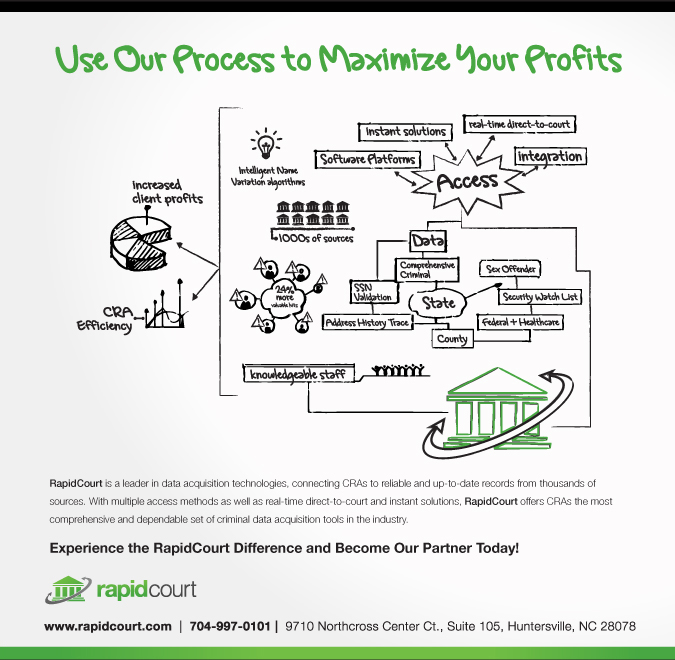
Public
Record Update
By Mike Sankey, PRRN
| Important
Facts to Know About Searching Government Records
|
There are
four important truths about searching public records online from
government agencies-
- Less than
70% of government maintained public records are found online.
For example, only 65% of the state and local courts place access
to felony data online.
- Government
sites can be free or fee-based. Generally, the fee-based sites
are more robust.
- Most free
government public record websites contain no personal identifiers
beyond the name. This can be a problem when researching a common
name.
- Depending
on the type of record, often the searchable and viewable information
found online is limited to name indexes and summary data rather
than document images. Most access sites - especially the free
access sites - permit the former, not the latter.
Keep these
four truths in mind and your public record searching will lead
to better results.
If you are
looking for the more than a links list - please check out
BRB's Public Record Research System (PRRS).
| Larry
Henry and BRB Publications Launch New HR Version of the
State Rules Register |
Mr. Larry
Henry and BRB Publications launch a new product The HR
Version of the State Rules Register. It is designed very
similar to a private label product. Access is unlimited from the
CRA's site - no log-in is needed.
A CRA can
now provide their clients with an easy-to-use and up-to-date tool
showing individual state restrictions placed on HR, hiring managers,
and landlords.
See www.CRAHelpdesk.com
for details!
| BRB's
FREE RESOURCE CENTER |
For the MOST
COMPREHENSIVE RESOURCE describing all access methods, restrictions,
fees, and search procedures on over 26,000 government and private
agencies visit the Public Record Research System (PRRS-Web) .
We provide the extensive details and in-depth data you will not
find doing a Google search!
For more
information contact Michael Sankey at mike@brbpublications.com
or visit www.brbpublications.com/updates.aspx


deverus Sets New Bar for System Uptime Standards in Background
Check Industry
Background screenings play a pivotal, time-sensitive role for
employers seeking to bring new staff on board as quickly and cost-effectively
as possible. Aiming to increase system uptime levels for background
check companies that serve those employers, deverus, Inc., announced
the opening of its new backup data center in Dallas-a move that
company leaders and industry experts agree is likely to shake
things up in the background check industry.
Officials at deverus, the leading provider of mission-critical
workflow solutions to the background check industry, expect this
increased level of service to set more rigorous industry standards
for system reliability, bringing background screening companies
more in line with other industries, including global banks, credit
card companies, and major online retailers.
"This new, redundant data center will enable us to offer an unprecedented
level of uptime due to having mirrored data and applications running
at two independent sites," said deverus CEO Shane Long. " Our
objective is to achieve the 'four nines,' or 99.99 percent system
uptime. While such an unprecedented level of service availability
has required a substantial investment, we are excited to move
toward offering this superior level of system reliability and
greater peace of mind to our clients." In addition to the increased
uptime levels, Long says deverus's use of dual, co-located, ISO-9001
data centers will also provide background check companies with
new security features, including advanced technologies to guard
against hacking, viruses and other risks. Moreover, the geographic
separation of deverus's Dallas and Austin data centers will ensure
greater preparedness and minimize service interruptions in the
event of a natural disaster or other unforeseen catastrophic event.
Read more

 Straight Line
International Donates $5K for Chamber Golf Tournament Straight Line
International Donates $5K for Chamber Golf Tournament
Straight
Line International donated $5,000.00 for the sixth annual golf
tournament hosted by the Saipan Chamber of Commerce for their
scholarship fund. Straight Line International/The HR Screener,
doing business as The Background Investigator, is operated by
Steven Brownstein, who has been a member of the chamber since
2005.This year's tournament was called '"2013 Saipan Chamber of
Commerce/Steve Brownstein Golf Classic and was held at the LaoLao
Golf Resort.
Source: The
Background Investigator

Adam Townsend Named Chief Operation
Officer of Infomart
InfoMart's
president and chair, Tammy Cohen, announced that Adam Townsend
has been promoted to chief operating officer (COO). In this role,
Townsend will continue to oversee the processing of InfoMart's
core services, customer service, and legal compliance. "Adam is
a proven company leader, and has emerged as one of the most respected
voices in the background screening industry," Cohen said. "He
has been instrumental in the continued growth of our operations
team, and we are proud to recognize his contributions to our success."
Townsend has a long history with InfoMart and more than a decade
of experience in screening and investigations.
For more
information about InfoMart, please visit www.infomart-usa.com
or call (770) 984-2727.

Accurate
Background Appoints Tim Dowd to Board of Directors
Accurate
Background, Inc., a leader in the background screening industry,
announces the appointment of Tim Dowd, former Director of eScreen
and President and CEO of Current Analysis, to its board of directors.
Tim joins the ABI board following a successful board assignment
with eScreen. Tim was a member of the eScreen board of directors
from 2008 to its successful sale to Alere in 2012. During Tim's
tenure at eScreen the business doubled revenues and tripled EBITDA.
He was also instrumental to the Pembroke/eScreen merger in 2009.
"We are pleased to welcome Tim to the board of directors," Dave
Dickerson, President and CEO of Accurate Background, said. "He
brings to the board a wealth of knowledge and experience in the
employment screening industry, and a proven record of successful
business leadership to help our continued growth. We look forward
to his contributions to the board."
For more information about Accurate Background call 800.784.3911
or visit their web site at www.accuratebackground.com.

 backgroundchecks.com
Enters into Alliance to Offer Dexter Background Data backgroundchecks.com
Enters into Alliance to Offer Dexter Background Data
backgroundchecks.com,
a leading provider of background screening solutions to consumer
reporting agencies (CRAs), has allied with Neno Research to offer
Neno's flagship Dexter Background Data offering to backgroundchecks.com
clients. The cooperative between Neno Research and backgroundchecks.com
combines Dexter, an automated data retriever designed to help
streamline the background checking process for screening companies,
with backgroundchecks.com's multi-jurisdictional criminal database.
The combination of that database's coverage and Dexter's real-time
integration court network offers unsurpassed coverage and timeliness
to background screening companies.
backgroundchecks.com
president, Craig Kessler, spoke highly of the alliance, saying
"Dexter's product is truly unique. It helps CRAs drastically reduce
turnaround time on county criminal history searches while maintaining
the level of quality that CRAs need." Kessler continued, explaining
that "by bundling Dexter and our database searches, our clients
get the best of both worlds - a database known for its quality
and coverage and court searches known for comprehensiveness and
quick turnaround. These are the issues that matter to our clients."
For more
information about backgroundchecks.com
and our offerings, please visit backgroundbiz.com.

Middle
Market Expects to Create One Million Jobs in 2013
The nation's
200,000 middle market businesses are an economic engine driving
the U.S. recovery, growing revenue at a rate of five percent during
2013, which was five times higher than the S&P 500. According
to the National Center for
the Middle Market's (NCMM) latest quarterly Middle Market Indicator
(MMI) , mid-sized firms grew employment last year faster
than small and large companies at a rate of 2.5 percent, which
created 1.2 million jobs. The MMI also revealed
that mid-market executives believe continued government uncertainty
and concerns over compliance with certain federal regulations
are moderating the segment's outlook for 2014, which projects
4.3 percent revenue and 2.2 percent employment growth over the
next 12 months.
The U.S.
middle market, made up of businesses with revenue between $10
million and $1 billion, contributes one-third of non-government
U.S. GDP and accounts for 44.5 million jobs, or one-third of total
U.S. employment. With a projected employment growth rate of 2.2
percent, the middle market could add as many as one million jobs
to the U.S. economy in 2014. Although this outpaces national growth
trends, the middle market would create 200,000 less jobs than
last year.
Read more

App,
App and Away for Background Screening
South Africa's
first mobile app for background screening has been released by
Managed Integrity Evaluation (MIE), Africa's leading background
screening company. The app - dubbed MIE Touch - is available on
Android and Apple smartphones and tablets. A Windows 8 version
is in the pipeline and will be available soon.
The free
app was designed and developed for employers, HR managers and
recruiters who are constantly "on the go" and require real-time
updates regarding background screening requests. The app saves
them the hassle and inconvenience of having to carry a laptop,
go online and download e-mails or login and navigate the Web site.
MIE's CEO,
Ina van der Merwe, says MIE Touch gives users the edge in a highly
competitive industry. "The app is like background screening on
fast forward! Quick answers enable quick decision-making, which
has a wide range of benefits for everyone involved in the recruitment
cycle, including better flexibility, improved service levels,
increased capacity and reduced risk."
Read more


Contact Barry Nixon at 949-770-5264
or at wbnixon@aol.com for
more information.

What
Can We Do For You in 2014 To Help You Exceed Your Revenue
Goals? |
Targeted
Marketing Support Services for the Background Screening Industry
PreemploymentDirectory.com
Online background
screening directory featuring background screening firms and suppliers
to the background screening industry. Basic, Gold, Platinum and
Diamond levels of advertising are available. Target audience is
the Human Resources, Talent Acquisition and Recruiting community.
New Opportunities:
Annual Background Screening
Industry Buyers Guide
An annual
print and electronic publication featuring U.S. and international
background screening firms, and timely informative articles. The
Guide is launched annually in June at the SHRM Annual Conference
and distributed to 20,000 plus human resources professionals.
Annual Suppliers to
the Background Screening Industry Buyers Guide
An annual
print and electronic publication featuring suppliers to the background
screening industry. The Suppliers guide is distributed to our
database of more than 1,600 background screening firms and at
relevant professional trade shows.
The Background Buzz
A monthly
e-newsletter distributed to the worldwide background screening
industry that offers comprehensive coverage of information and
news relevant to the screening industry. The e-newsletter is distributed
to more than 1,600 firms in the background screening industry
and accordingly, is an exceptional advertising venue to reach
background screening firms.
The Special International
Edition of The Background Buzz
A supplement
to the regular edition of The Background Buzz that is
published on a bi- monthly basis featuring global information
and news on background screening around the world.
eDirect Mail Campaigns
On demand
e-blast service sent to our database of more than 1,600 firms
in the background screening industry. Each e-blast includes your
advertisement and one relevant article.
Media Releases and Announcements
On demand
releases and announcements to targeted media outlets in the background
screening and recruiting industry.
Private Label Newsletter
Service
Custom designed
e-newsletter service. We create a custom designed e-newsletter
including recommending the name, designing the header, template
and providing the content. Distribution frequency options include
monthly, bi-monthly and quarterly.
See
the Marketing Portfolio that matches your market segment
:
1. U.S. Background Screening
Industry Marketing Portfolio
2. International Background
Screening Industry Marketing Portfolio
3. Suppliers to the Background
Screening Industry Marketing Portfolio

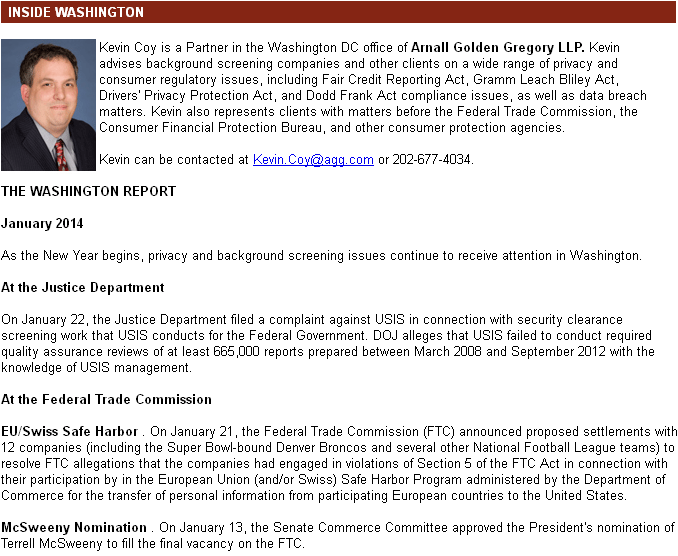
Read
the full report

One
Site! Many Suppliers! |
2013-2014
SUPPLIERS TO THE BACKGROUND SCREENING
INDUSTRY BUYERS GUIDE NOW AVAILABLE!
Looking for the Top Suppliers in the Industry? Need to find a
new Supplier?
Visit our VENDOR SHOWCASE
which features suppliers to the Background Screening Industry.
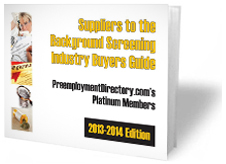
Click
here or on image to get a copy

Infosys
I-9 Audit Results Likely to Trigger ICE Audits of Computer Consulting
Firms
Infosys Limited's recent $34 million settlement with the U.S.
Government resolved the threat of criminal charges against the
company based on allegations of visa fraud. During the course
of the investigation, U.S. Immigration and Customs Enforcement
(ICE) audited the company's Form I-9 files and reported that more
than 80% of the company's Forms I-9 contained "substantive" errors
meriting civil money penalties. Using the company's reported U.S.
headcount and turnover rate, this translates to roughly over 13,500
violations and total potential civil money penalties of over $12.6
M at a base penalty rate of $935 per violation according to the
ICE fine-setting matrix. Infosys voluntarily made a substantial
investment in a new electronic Form I-9 compliance system and
companywide Form I-9 compliance training in an effort to demonstrate
its commitment to immigration compliance. Further, as a condition
of settlement, Infosys agreed to hire an independent monitor at
its expense to audit 4% the company's I-9 forms annually and file
I-9 compliance reports with ICE for two years, and to subject
itself to unannounced reviews by ICE auditors. Consulting firms
that are dependent on a U.S. workforce of temporary foreign workers
would be well advised to invest in a confidential Form I-9 compliance
audit to assess the weaknesses in their compliance systems and
initiate corrective action before being served with a 3-day notice
of inspection by ICE. Making such an investment could save a company
millions of dollars in fines and penalties for paperwork violations.
Read more

Is Your Organization Ready for an OSC Investigation?
The Office of Special Counsel (OSC) is part of the Justice Department's
Civil Rights Division. The OSC regularly investigate complaints,
fielded by other agencies like the U.S. Citizenship & Immigration
Service (USCIS), or by complaining parties, like employees, former
employees or job applicants about potential immigration-related
violations. Unlike ICE, which audits I-9 records, the OSC is charged
with investigating complaints about the way an employer has managed
its I-9 or E-Verify process. Sometimes, the complaints are found
to be without merit. In those cases though, employers typically
still undergo training and some form of remedial measures, including
OSC webinar trainings and/or E-Verify tutorial trainings. In the
case of valid complaints, employers are subject to even more remedial
measures. Where the complaints arose from employees (or former
employees) who were harmed, it's common for employers to pay back
wages to those employees, and reinstate those workers if the workers
agree to be reinstated. The OSC provides a plethora of educational
webinars that are free, to employers. The OSC can impose monetary
penalties against employers who violate the law. Your organization
should partner with an experienced immigration or employment attorney
familiar with the laws that govern the Immigration and Nationality
Act, 8 U.S.C. § 1324b. These allies will provide you with
a realistic assessment of the strengths and weaknesses of your
case, so that you can make an informed decision on when, or if,
you should settle the case.
Read
more

Top 5 Common I-9 Errors as Seen Through the Eyes of OCAHO
In reviewing the numerous OCAHO decisions issued in 2013, there
have been some fairly common violations that have gotten employers
in a lot of trouble. The most common violation is the most basic:
failure to prepare an I-9 form, especially failing to complete
an I-9 Form until after being served with a Notice of Inspection
(NOI). Unfortunately, ignorance of the law, even if it is the
truth, is no excuse. The second most common violation is failure
to ensure the proper completion of Section 1 of the I-9 Form.
The responsibility for executing an error-free Form I-9 rests
solely on an employer, even if Section 1 must be completed by
an employee. A third, common I-9 error is the backdating of I-9
Forms. Backdating occurs when the form is signed and the date
indicated is not the date the form was actually signed, but when
the form should have been signed, days, months or even years prior.
Often, this violation is committed in conjunction with the failure
to complete the I-9 Forms until after the service of the NOI.
Employers also commit a wide variety of errors in the completion
of Section 2. The one violation that is rarely present in OCAHO
decisions is knowingly hiring and/or employing unauthorized workers.
This is probably because those employers who have knowingly hired
and/or employed unauthorized workers are less likely to litigate
a case before OCAHO, unless it had a strong argument it did not
actually knowingly hire an unauthorized worker.
Read
more

What are the Form I-9 Penalty Trends from 2013 OCAHO Decisions?
The first thing that stands out about 2013 decisions from OCAHO
is that there was a major uptick in the number of substantive
decisions - 30, up from 11 in 2012. There were also eight decisions
which involved Office of Special Counsel issues. Of the 30 substantive
decisions concerning I-9 form violations, 29 of them involved
the issue of the amount of penalties. One decision, Ketchikan
Drywall Services, Inc., was the acceptance of the 9th Circuit
Court of Appeals' decision affirming $173,250 in penalties. One
of the most interesting points in these 28 decisions (discounting
the Ketchikan case for the above reason) was the reduction in
penalties assessed by OCAHO as compared with penalties actually
sought by ICE. In 2012, OCAHO reduced penalties sought by ICE
by an average of 45%, whereas in 2013, the average reduction increased
to 46.5%. The primary reasons for the reductions were the poor
financial conditions of the companies (20 decisions) and the court's
belief that the ICE penalties sought were "unduly punitive" on
small employers (13 decisions). This was consistent with the 2012
OCAHO decisions, in which these were the two primary factors for
reducing the penalties. On a few occasions, employers were successful
in prevailing on legal issues, which ultimately caused OCAHO to
dismiss these allegations. Due to the fact that employers are
getting so much relief from OCAHO (an average reduction in penalties
of 46.5%), it is anticipated more employers will be challenging
ICE's assessed penalties.
Read more



Grab a latte
and pull up a chair and join us for a great interview with Jackie
Pirone, Director Marketing SAT and IR, OraSure Technologies.
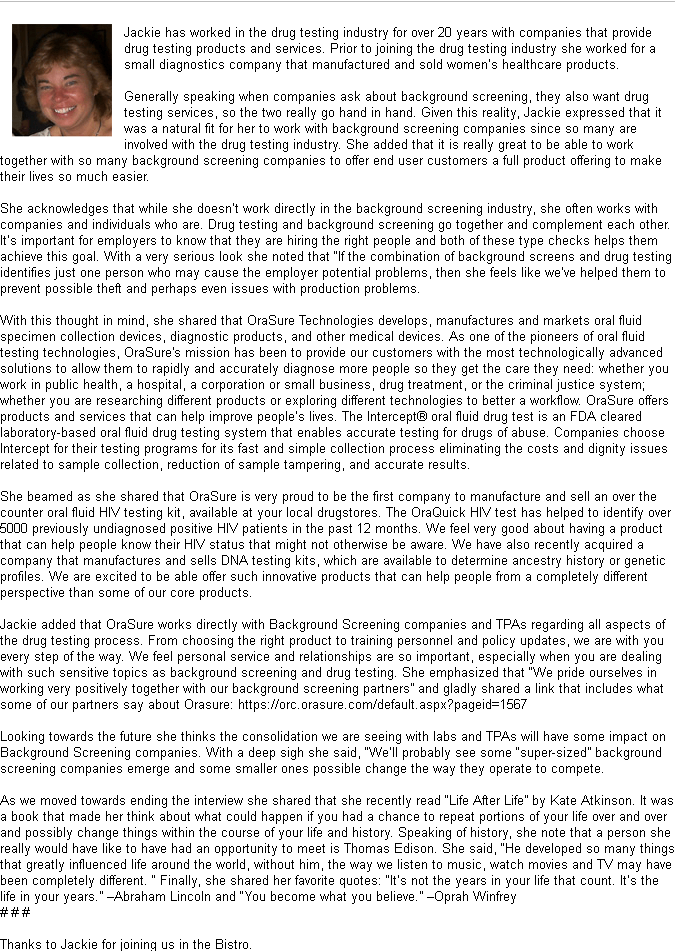

A
New Handy Guide to Global DPAs
DLA Piper has attacked the problem of surveying the world's data
protection laws and regulations with a handy online and interactive
guidebook for which they've released version 2.0 just in time
for Data Privacy Day. It begins with a map of the world, with
countries colored to indicate the strength of their privacy laws
(red=heavy regulation; green=not so much), and then you have tabbed
options for turning the page to see a specific country's law,
regulator contact information and then specifics on how a country
regulates anything from infosecurity to breaches to electronic
marketing. It's also possible to set two countries side by side
and compare the way they regulate date protection. They offer
a mobile interface, or you can download all of the information
in a readable PDF. "People are saying, 'You're crazy to give away
this kind of information,'" said DLA Piper Partner Patrick Van
Eecke, "but our strategy is that we can give away this kind of
information because we want to get into more complex legal situations
like developing strategies for data protection. It's not interesting
just advising on what you have to do in one country vs. another.
We don't want to make our money with that." There are 65 different
jurisdictions covered in the tool, and the PDF runs to some 360
pages of information. As a living, breathing online organism,
it will require almost constant updates so as not to become quickly
outdated.
Read more
| ASIA
PACIFIC AREA COUNTRIES |
Employment is The Top Discrepancy Type in APAC
According
to the 'First Advantage Employment Screening Trends Report:
Asia Pacific' results with a discrepancy in employment history
have increased by 13.6% year-over-year in Asia Pacific.
In general, APAC employers have increased their use of background
screening, with 40.4% of all cases subjected to at least six checks
in Q1 2013, compared to 38.5% last year. The report found that
employers who conduct six background checks or more were nearly
nine times more likely to uncover an alert (26% discrepancy),
compared to those who conducted only one or two checks (three
per cent).
There has also been a growing trend toward "infinity screening."
Read more
Australian Privacy Act Changes Smell SOXish
The Privacy Amendment (Enhancing Privacy Protection) Act 2012
was introduced to the Australia Parliament in May 2012 and was
passed in November that year. The new act includes a new set of
harmonised privacy principles that regulate the handling of personal
information by both Australian businesses and government agencies.
Unfortunately, these commendable changes introduce problems that
reflect the ambiguity of the Sarbanes-Oxley (SOX) legislation
in the U.S. Enacted in 2002, the SOX law enhanced standards for
U.S. public company boards, management and public accounting firms
that required top management to individually certify the accuracy
of financial information, applying much more severe penalties
for fraudulent financial activity. While SOX has raised the compliance
bar for corporate reporting, it has had the unintended impact
of creating a lot of uncertainty because of its lack of precision.
In fact, during the past decade, Sarbanes-Oxley compliance costs
and complexity have run out of control in the U.S. From March,
Australian organisations will face the same dilemma with the new
Australian privacy law - they "must take reasonable steps" to
demonstrate compliance with the new legislation without a clear
understanding of exactly what is required. To successfully comply
with the new Australian Privacy Principles without onerous costs
and complexity, both public and private sector organisations need
to take special note of key changes to the law and act now to
prepare for March 2014.
Read more
Mid
Employment Checks - Legal but Complicated
The effects
of a new rule placed by the Canadian government institution are
beginning to come to the surface, especially now that Canada's
Post Corp., its main postal service provider has changed its policy
to match it. Its 71,000 employees will have to adhere to the new
policy, which required background checks for mid-employment positions.
Its main opposition comes from the Canadian Union of Postal Workers
(CUPW), who are opposed to the new policy for several reasons,
including the vague requirements outlines, the lack of disclosure
about the purpose and scope and the risk of discrimination.
The Canadian
Human Rights Commission assures employees that asking a current
employee to sign a consent form for background checks is in no
way a violation of their human rights.
Read more
Employers'
Obligations To Protect Workers' Information
In order
to develop a fundamental constitutional right, the Habeas Data
Law (1581/2012) was passed almost one year ago. The law develops
and guarantees a person's right to know, update and correct the
information held about him or her in a database. The main requirement
when collecting employee information is to obtain their free,
explicit, prior and informed consent, and retain a written copy
of such consent.
The law established
the Data Protection Department within the Industry and Commerce
Superintendence, which has the power to monitor employers' databases
in order to facilitate employees' right to know, update and correct
the information held about them in those databases. It also has
the power to punish an employer which fails to comply with the
law with a fine of up to 2,000 times the statutory monthly minimum
wage (Ps1.179 billion or $612,785).
Read more
Liar
for Hire? Fake CVs Floor Indian Job Market
Managers of an IT company in New Delhi were puzzled as they sifted
through a pile of CVs - as many as 30 job seekers claimed to have
worked previously for the same employer. Unwilling to take any
chances, the managers approached a firm of professional sleuths
that specializes in screening background information given by
prospective employees. The "employer" turned out to be an owner
of a dingy one-room mobile repair shop who was pretending to be
an HR manager of a fake IT firm. In return for money, he answered
verification calls and described how the candidates had worked
for him previously doing data entry. Forging qualifications, faking
experience, and inventing companies - desperate candidates are
resorting to all sorts of fraud to land jobs in a tough Indian
employment market. A survey by AuthBridge, which has screened
millions of candidates, showed that nearly one in five had fudged
some information on their CV in 2012-13 and as many as 51% submitted
fake education documents. Background screening was hardly heard
of in India until the turn of the millennium, and has been largely
driven by the outsourcing and IT industry, one of India's biggest
economic success stories. The Indian Association of Professional
Background Screeners pegs the size of the industry at about $32
million annually and growing fast. "The need for background verifications
will continue to grow as entities continue to fudge data and make
false claims," said Tejas Sanghvi from Supersoft.
Read more

 Don't
Let Employment Investigations in APAC be the Weakest Link
in Your Background Screening Services. Don't
Let Employment Investigations in APAC be the Weakest Link
in Your Background Screening Services.
The
best designed background screening program is only as good
as its weakest link. With more than 11 countries represented
in the APAC Chapter of NAPBS our trusted members can help
you meet your employment screening needs in the APAC region.
Click
here to see the countries represented.
To tap into some of the best employment screening firms
in APAC advertise in the APAC Background Screening
Report. It’s your source to access the APAC
region to find a trusted employment screening partner.
Click
here to see the APAC Background Screening Report
Media Kit to strengthen your employment screening
services today.

|

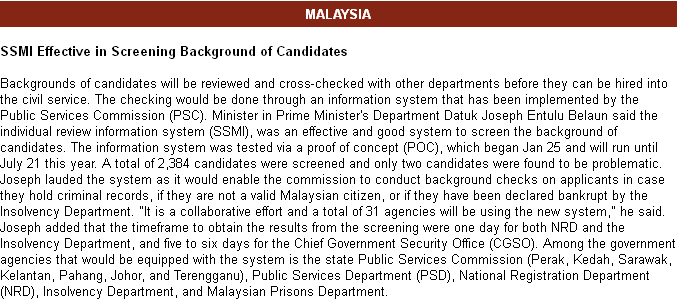
Read more
New
Zealand Data Protection Authority's Powers Held Back By Government
Veto
The
Privacy (Giving Privacy Commissioner Necessary Tools) Amendment
Bill that would have given greater powers of control to the
New Zealand data protection authority, the Office of the Privacy
Commissioner (the DPA), has been blocked by a negative vote in
New Zealand Parliament.
The draft
bill proposed by the Labour opposition party states, "At the moment,
enforcement of the Privacy Act 1993 is complaints-driven. People
can complain to the Privacy Commissioner about breaches of their
privacy rights under the Act. But the Commissioner has only limited
powers to take action about breaches of the Act of its own initiative.
Such a system is not well suited to addressing underlying systematic
problems."
Read more
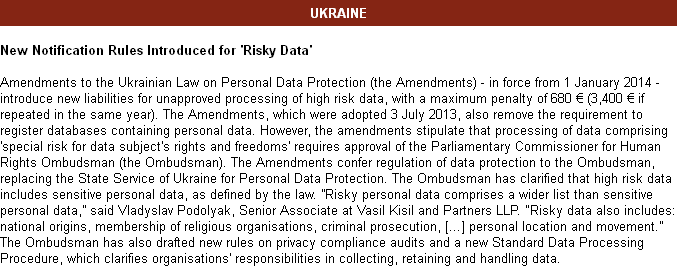
Read
more

|
ADVERTISERS IN THIS EDITION |


|  |
|
|
| |
|
Background
Screening Jobs |
|
Visit
the Job Board for the Employment and Tenant Screening Industry.
Here you will find resumes of people with industry experience
and employers seeking applicants with experience in Employment
and Tenant Screening and related businesses.
www.backgroundscreeningjobs.com


|
UPCOMING CONFERENCES, COURSES & EVENTS |
Feature
Education:
 |
OraSure
Technologies is sponsoring a webinar on "The Marijuana Dilemma
and What Employers Can Do About It," presented by Bill Current,
WFC & Associates, LLC. Join us, February 12th, 2014
at 2:00pm EST.
Click here to register or for more information.
|
2014 Events ( Click
Here to View full list of Events ) - Updated
Monthly
SHRM
State Conferences, visit
http://www.shrm.org/Conferences/StateAffilliateConferences/Pages/default.aspx
Drug
and Alcohol Testing Industry Association (DATIA), 2013 Training
Course Schedule, visit
http://datia.org
SAPAA
Training Institute Learning Events, http://www.sapaa.com/
CUPA-HR
Conferences: http://www.cupahr.org/
World
Federation of People Management Associations, Events,
http://www.wfpma.com/events/by-region#quicktabs-tab-view__events__page_3-4
|
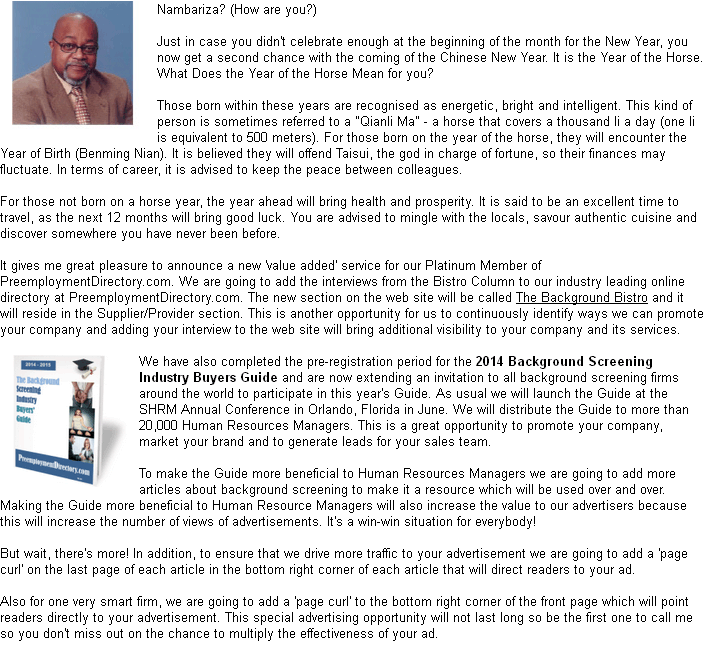

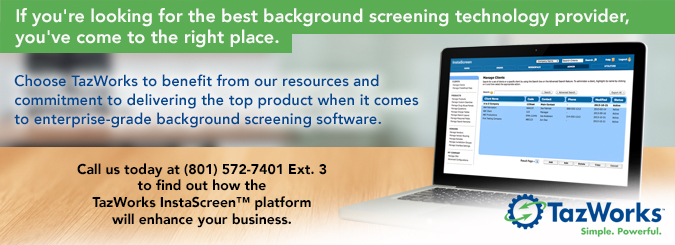





 Straight Line
International Donates $5K for Chamber Golf Tournament
Straight Line
International Donates $5K for Chamber Golf Tournament
 backgroundchecks.com
Enters into Alliance to Offer Dexter Background Data
backgroundchecks.com
Enters into Alliance to Offer Dexter Background Data






 Don't
Let Employment Investigations in APAC be the Weakest Link
in Your Background Screening Services.
Don't
Let Employment Investigations in APAC be the Weakest Link
in Your Background Screening Services. 




